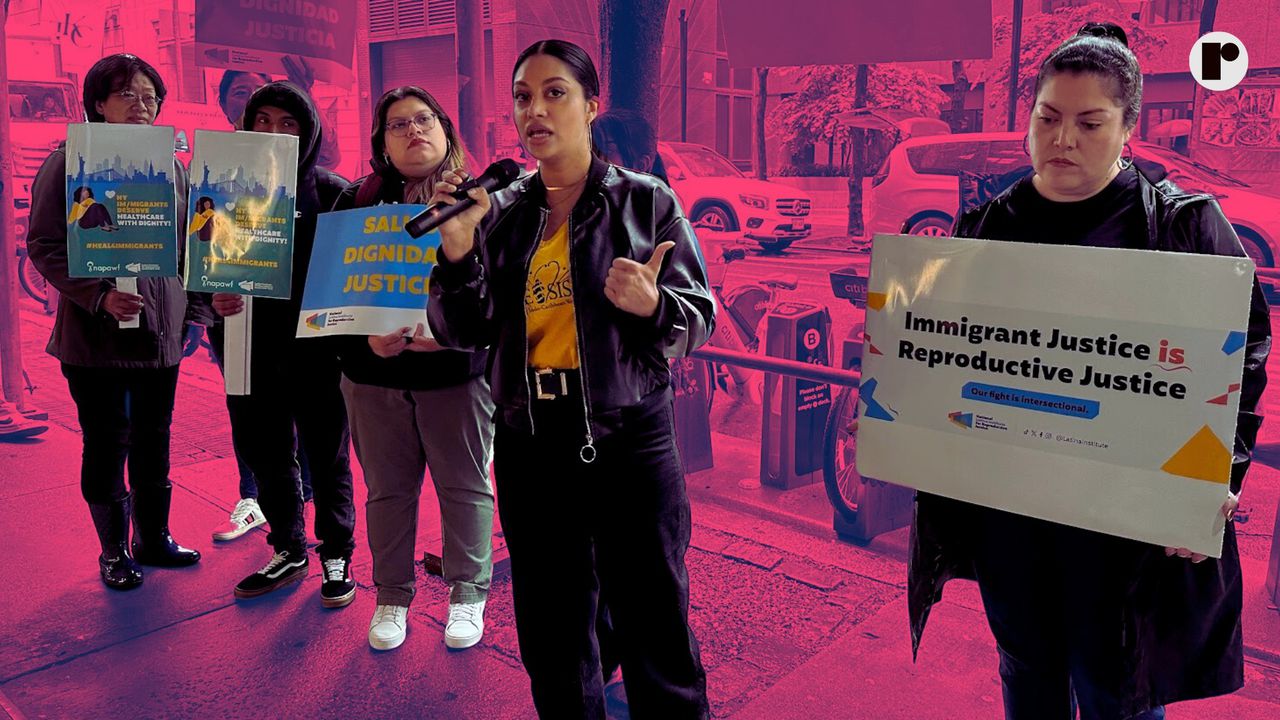What you need to know about the HEAL Act and how it could change the game for immigrant abortion access
On Tuesday, organizers gathered in New York City outside of Senator Chuck Schumer’s office to demand his support of the Health Equity and Access under the Law (HEAL) for Immigrant Families Act. HEAL, which was reintroduced in congress in July, aims to remove some of the barriers immigrant families and DACA recipients face in accessing healthcare.
“All of us, of every documentation status, should have access to the healthcare we need so that we can take care of ourselves and our families with dignity. Immigrants are here to stay and are a vital part of this city and this country,” Elizabeth Estrada, NY Field and Advocacy Manager at the National Latina Institute for Reproductive Justice (Latina Institute) said at the rally.
The Latina Institute and National Asian Pacific American Women’s Forum (NAPAWF) say that the fight to pass this legislation is essential to furthering reproductive rights for everyone, because if the reproductive justice movement views access to reproductive healthcare as a human right, then that irrefutably includes immigrants.
“I don’t think you can have a full movement and leave certain groups behind. If we’re going to fully realize what reproductive health rights and justice looks like in this country. We meet everybody, and that includes immigrants, in that conversation,” said Jennifer Driver, Senior Director of Reproductive Rights at the Reproductive Freedom Leadership Council.
The HEAL Act
The Latina Institute, NAPAWF and the HEAL For Immigrant Families Coalition have collaborated to make this happen on a HEAL Week of Action to push forward the legislation.
There are an estimated 45 million immigrants currently living in the U.S., many of whom are uninsured or face additional barriers to healthcare because of their status.
Healthcare options available to immigrants can be determinant of their status. For example, undocumented immigrants are not eligible for federally-funded programs like Medicaid though a few states, like Illinois, offer state-funded alternatives. DACA recipients are also ineligible, though the Biden Administration recently proposed legislation that would expand coverage. About half of undocumented immigrants are uninsured.
After receiving “qualified” immigration status, must wait 5 years before they can enroll in Medicaid or the Children’s Health Insurance Program (CHIP).
The HEAL act would expand affordable health coverage to DACA recipients and remove the 5-year waiting period that currently prolongs people from receiving care. It would also give states the option to expand Medicaid and CHIP to undocumented people.
Reproductive rights and immigrants
“Often immigrant communities lie at the intersection of barriers to both health care coverage and abortion access and are often among the first to be disproportionately harmed by restrictions on abortion care,” said Lucie Arvallo, Senior Policy Analyst at the Latina Institute.
Texas has the second largest immigrant population by state, and some of the harshest abortion restrictions in the country.
“Immigrants living in the border communities are heavily surveilled by state and federal law enforcement which heightens their fear and makes it less likely for them to get care,” said Driver.
Reckon previously reported on how abortion restrictions in Texas disproportionality affect immigrant women. One example is travel. While many Texans in need of abortion travel to other states to access care, traveling, especially by flying, isn’t an option for undocumented individuals.
“In some states where the closest abortion clinic can be hundreds of miles away, traveling for care can be nearly impossible, especially if you’re needing to travel beyond an immigration checkpoint or a Customs and Border Patrol checkpoint,” explained Arvallo.
Fear of deportation is also a barrier that prevents individuals from receiving care. Immigrants have reported avoiding health services, even prolonging care until their condition was critical.
“When we limit access to health care, affordable health care coverage, we also limit access to reproductive health care and so that includes things like no cost contraception, maternity health services, and even basic preventative services like cancer screenings,” said Arvallo.
Research found that low-income immigrants in states with strict public insurance policies were 11% less likely to receive postpartum care.
“If reproductive justice is the belief that everyone should be able to determine if, when, and how to start a family and to raise that family in a safe and sustainable environment, that vision is impossible to achieve if it is not inclusive of immigrant communities,” says Arvallo.
